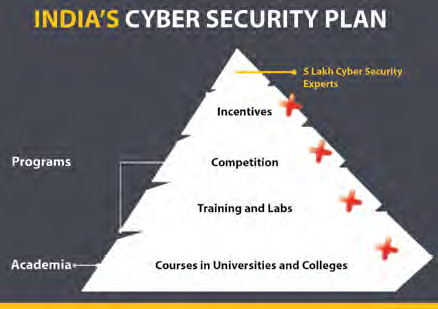I think India is late in the game by about 10 years, but at the same time the heart of the government is in the right place. What they’ve done right is the appointment of Gulshan Rai as the cyber security coordinator. At least now there is a single point that you know you can go to with all of your questions and problems. To me, it was more of a vision statement. It’s a step in the right direction. The journey from a visionary cybersecurity policy to a tactical implementation to an actual change on ground is a long way. India’s cybersecurity budget is about a mere seven million US dollars, but that of NSA is billions of dollars, out of which the department of Homeland Security gets 658 million dollars, and the US CERT gets 93 million dollars. Also, India needs five lakh professionals in the next two years that is unlikely to be met due to lack of infrastructure and investment. How do you produce them in the country when none of the colleges actually have cyber security specialisations? That is not going to be easily achievable. You will need a pool of 25 lakh to pick five lakh.
done right is the appointment of Gulshan Rai as the cyber security coordinator. At least now there is a single point that you know you can go to with all of your questions and problems. To me, it was more of a vision statement. It’s a step in the right direction. The journey from a visionary cybersecurity policy to a tactical implementation to an actual change on ground is a long way. India’s cybersecurity budget is about a mere seven million US dollars, but that of NSA is billions of dollars, out of which the department of Homeland Security gets 658 million dollars, and the US CERT gets 93 million dollars. Also, India needs five lakh professionals in the next two years that is unlikely to be met due to lack of infrastructure and investment. How do you produce them in the country when none of the colleges actually have cyber security specialisations? That is not going to be easily achievable. You will need a pool of 25 lakh to pick five lakh.
| India is lagging behind in the cybersecurity game by 10 years”, says Amit Kumar, President Cyberfort India |
The country is lagging behind in its fight in cyberwarfare that has adopted innovative ways to attack governments and organisations causing huge financial losses. India has been ‘extremely late’ on framing the cyber security policy, which was launched by the government early this month. Cybersecurity policy is a great vision statement but I don’t think India has got a tactical plan. India does not have the environment. It is yet to be created. I would be pleasantly surprised if India meets the target (of creating workforce).
The National Cyber Security Policy aims at creating a work force of 5,00,000 professionals in the next five years and build cybersecurity training infrastructure through public-private participation.
As compared to the US, which is putting in a lot of resources to create cyber security professionals, India needs to involve academia like universities, impart training, set up labs and foster competition to deal with cyber security issues which is entirely missing in the country. India ranks ninth on Kaspersky’s list of countries with the highest percentage of computer attacks and many of the government websites are still exposed to threats as proper investment has not been made to find a long term solution. According to official data, more than 1,000 government websites were hacked in the last three years.
When a government website is got hacked they call professionals who fix the problem. But they have no budget to carry on. They have no budget to hire right people, to train them and defend their websites.
It is evident that the best way to solve the disease of cyberplague is by introducing a cybervaccine programme that is needed to start at all levels of society through combative education plans. China is estimated to have 25 million experts in cyber security while 1.25 lakh are from the local government.
The US has 91,080 experts in the government while India has just 556 experts. While data points show that we are losing the fight, it is clear that the solution to the plague will happen when we will inject the vaccine. It is evident that the best way to solve the cyber plague is by introducing a cyber-vaccine programme that is needed to start at all levels of society through combative education plans.






















